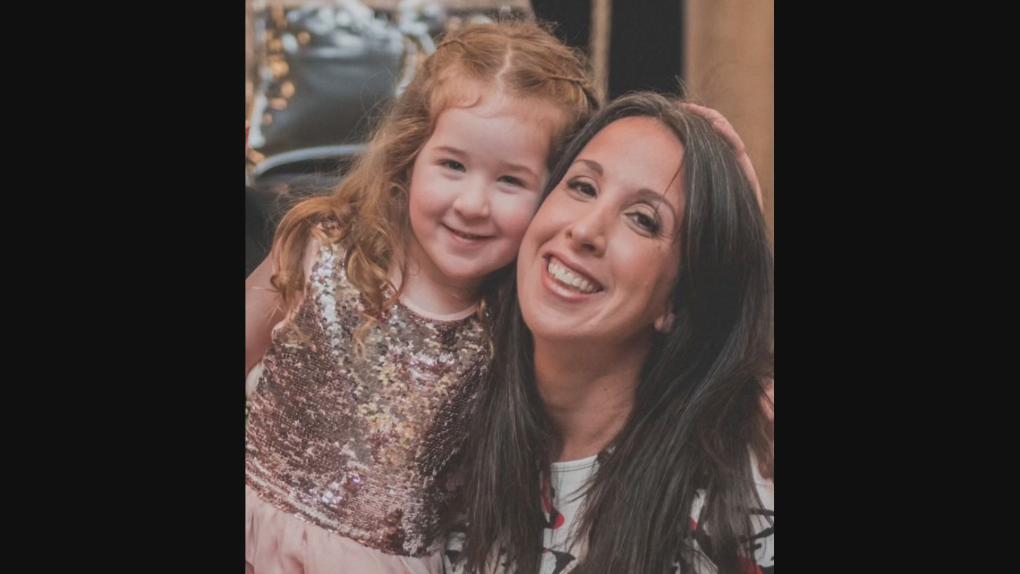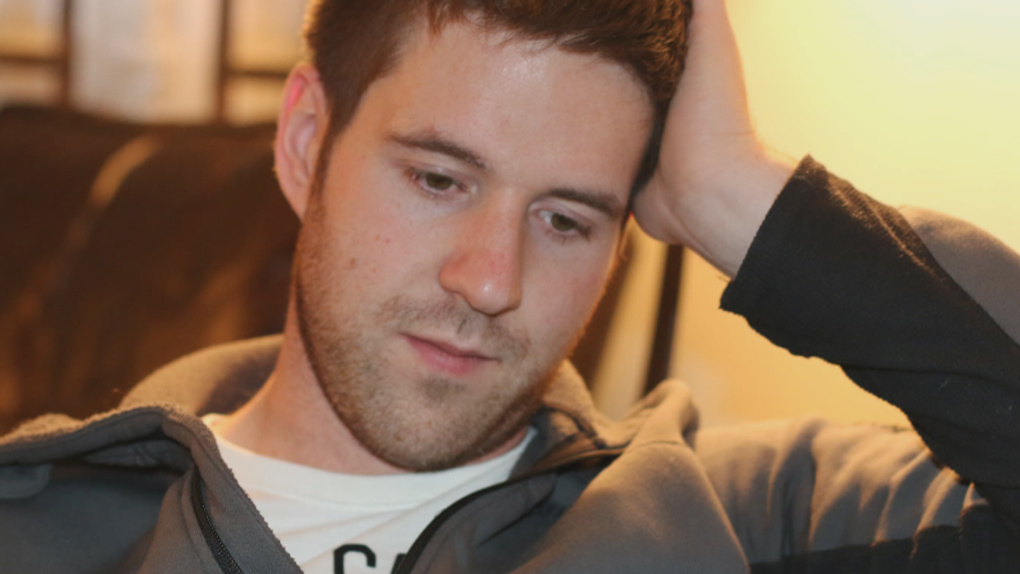Parents who kill their own children often exhibit warning signs: experts
In exclusive audio obtained by W5, a caseworker from Jewish Family and Child Service of Greater Toronto, admits to warning her bosses about the escalating behaviour of Robin Brown, just days before he and his daughter, Keira, were found dead at the bottom of a cliff at Ontario’s Rattlesnake Point, a conservation area west of Toronto. Brown had parenting time with Keira that weekend.
Keira’s mother, Jennifer Kagan-Viater, and current husband, Philip Viater, say the caseworker, only referred to as Amanda in the tape, came to visit them 10 days after the four-year-old’s death. Philip, a family lawyer, recorded that conversation.
“The behaviours (Robin Brown) was exhibiting were the same behaviours in people that go out and kill their kids,” Amanda said. “I don’t deny that, I’m getting chills. I don’t deny saying that and I’ve been very clear with my manager and my above manager.”
In a Statement of Claim filed by the Viaters in Ontario Superior Court on June 22, 2021, the couple names Jewish Family and Child Service, the caseworker and several other defendants.
They allege that in the months leading up to Keira’s death, Brown was exhibiting “escalating behaviour” like failing to return Keira back to Jennifer and Philip on three occasions.
“She's supposed to come home at a certain time and we're waiting. We're waiting and Keira is not there. It’s terrifying,” Jennifer said.
For Keira’s safety, Jennifer filed an emergency motion on Jan. 28, 2020 to supervise or suspend Brown’s access to Keira.
“This was an extremely dangerous predator who never should have had one iota of unsupervised time with this little girl,” Jennifer says.
 Keira Kagan with mother Jennifer (Supplied photo)The judge who presided over that emergency motion, Justice George MacPherson, found the evidence “persuasive and compelling” but adjourned the matter so that Jewish Family and Child Service could complete an investigation.
Keira Kagan with mother Jennifer (Supplied photo)The judge who presided over that emergency motion, Justice George MacPherson, found the evidence “persuasive and compelling” but adjourned the matter so that Jewish Family and Child Service could complete an investigation.
The judge said the organization had “eyes and ears on the ground” and could “request urgent relief at any time during the investigation.”
In the audio recording, the caseworker involved with that investigation, and who had interviewed Brown, tells Jennifer and Philip that she had “zero evidence that he would do something like this.” But she admits she had a bad feeling.
“Did I have a gut feeling? Not that he would kill her,” she explains. “But I had a gut feeling that he would escalate”.
Shockingly, Jennifer says this was not the first time the caseworker had told the family about these concerns. Jennifer says she got a call from the caseworker on Friday, Feb. 7, just days before Keira’s death.
“(She) admitted that Mr. Brown was the type of person to kill or harm his own child to get back at me,” Jennifer told W5.
“And she said that she had contacted her supervisor and she wanted a protection application. And the supervisor had said it could wait until Monday.”
Keira was found dead a day before that, on Sunday Feb. 9, 2020.
In the Statement of Claim, Jennifer and Philip allege that Jewish Family and Child Service and its employees “failed to protect” Keira, and “knew or ought to have known that Keira was in an imminent risk of danger and failed to intervene.”
W5 asked Jewish Family and Child Service for an on-camera interview, but they declined to comment on any “contact the organization may or may not have had with a family,” citing confidentiality.
Jennifer and Philip say that Jewish Family and Child Service’s failure was the last in a long line of systemic failures that preceded Keira’s death.
And they are convinced that Keira’s death was not accidental, but rather a revenge killing perpetrated by Robin Brown.
 File photo of Robin Brown (Supplied)A coroner’s report did not determine a cause of death, but noted that Halton Regional Police had identified multiple risk factors for domestic violence in Keira’s father. The case was referred to Ontario’s Domestic Violence Death Review Committee.
File photo of Robin Brown (Supplied)A coroner’s report did not determine a cause of death, but noted that Halton Regional Police had identified multiple risk factors for domestic violence in Keira’s father. The case was referred to Ontario’s Domestic Violence Death Review Committee.
Jennifer says there were signs her ex-husband could be dangerous, explaining how he emotionally and physically abused her. But she says the worst of it involved his controlling behaviour, which started soon after they were married in 2013.
“He behaved increasingly more and more controlling with me,” she explains. “I insist to have the passwords to all of your devices. I insist to know your whereabouts at all times, you know, becoming highly jealous,” she said.
In 2017, when she tried to raise concerns about Robin Brown’s abusive behaviour in a trial regarding Keira’s custody, Justice Douglas Gray said, “I am going to ignore it, it is not relevant.”
Professor Peter Jaffe, an expert in violence against women and children at Western University in London, Ont., says that was a grave mistake. Because if a mother is at risk, he says children are at risk too.
 Professor Peter Jaffe, an expert in violence against women and children at Western University in London, Ont., speaks with CTV W5.“They're at risk in terms of emotional and psychological well-being by being in that environment, and they may be at risk for being hurt in the crossfire or being killed in extreme cases,” he says.
Professor Peter Jaffe, an expert in violence against women and children at Western University in London, Ont., speaks with CTV W5.“They're at risk in terms of emotional and psychological well-being by being in that environment, and they may be at risk for being hurt in the crossfire or being killed in extreme cases,” he says.
Jaffe says judges have to take domestic violence more seriously. “It's a life and death issue that somebody is prepared to abuse their partner and who presents with significant risk factors; that partner may kill the children,” Jaffe says.
It may be hard to believe, but in Canada, 30-40 kids are killed by their parents each year.
According to Jaffe, the perpetrators of child homicides by parents in Canada are 60 per cent fathers and 40 per cent mothers.
“Women kill related to mental health disorders, postpartum depression,” Jaffe said. “Men tend to kill as an act of revenge for their partner leaving the relationship.”
Jaffe says the problem is often that judges want both parents to have access to their children, which he admits is a great idea for the majority of separated or divorced couples.
“But unfortunately, for 10 to 20 per cent of couples who separate where there's some serious issues around child abuse and domestic violence or intimate partner violence, those issues need to be thought out quite differently,” Jaffe adds.
After her ordeal, Jennifer is advocating for mandatory domestic violence training for judges. A new private members bill, dubbed ‘Keira’s law,’ which would expand judicial training for intimate partner violence and coercive control, is set to have a second reading in the House of Commons at the end of April.
CTVNews.ca Top Stories

Air Canada walks back new seat selection policy change after backlash
Air Canada has paused a new seat selection fee for travellers booked on the lowest fares just days after implementing it.
Province boots mayor and council in small northern Ont. town out of office
An ongoing municipal strike, court battles and revolt by half of council has prompted the province to oust the mayor and council in Black River-Matheson.
3 law officers serving warrant are killed, 5 wounded in shootout at North Carolina home, police say
Three officers on a U.S. Marshals Task Force serving a warrant for a felon wanted for possessing a firearm were killed and five other officers were wounded in a shootout Monday at a North Carolina home, police said.
'Shocked and concerned': Calgary principal charged with possession of child pornography
A Calgary elementary school principal has been charged with possession of child pornography, authorities announced Monday.
Health authority confirms cockroaches at B.C. hospital, insists they 'do not bite'
The Vancouver Island Health Authority is downplaying what staff describe as a cockroach infestation in a medical unit of Saanich Peninsula Hospital.
Toronto police arrest 12 people, lay 102 charges in major credit card fraud scheme
Toronto police say 12 people are facing a combined 102 charges in connection with an investigation into a major credit fraud scheme.
Winner of US$1.3 billion Powerball jackpot is an immigrant from Laos who has cancer
One of the winners of a historic US$1.3 billion Powerball jackpot last month is an immigrant from Laos who has had cancer for eight years and had his latest chemotherapy treatment last week.
Britney and Jamie Spears settlement avoids long, potentially ugly and revealing trial
Britney Spears and her father Jamie Spears will avoid what could have been a long, ugly and revealing trial with a settlement of the lingering issues in the court conservatorship that controlled her life and financial decisions for nearly 14 years.
WATCH 'Double whammy': What happens if you don't file your taxes by the deadline
The clock is ticking ahead of the deadline to file a 2023 income tax return. A personal finance expert explains why you should get them done -- even if you owe more than you can pay.
Local Spotlight

Canada's oldest hat store still going strong after 90 years
Since 1932, Montreal's Henri Henri has been filled to the brim with every possible kind of hat, from newsboy caps to feathered fedoras.
Road closed in Oak Bay, B.C., so elephant seal can cross
Police in Oak Bay, B.C., had to close a stretch of road Sunday to help an elephant seal named Emerson get safely back into the water.
B.C. breweries take home awards at World Beer Cup
Out of more than 9,000 entries from over 2,000 breweries in 50 countries, a handful of B.C. brews landed on the podium at the World Beer Cup this week.
Kitchener family says their 10-year-old needs life-saving drug that cost $600,000
Raneem, 10, lives with a neurological condition and liver disease and needs Cholbam, a medication, for a longer and healthier life.
Haida Elder suing Catholic Church and priest, hopes for 'healing and reconciliation'
The lawyer for a residential school survivor leading a proposed class-action defamation lawsuit against the Catholic Church over residential schools says the court action is a last resort.
'It was instant karma': Viral video captures failed theft attempt in Nanaimo, B.C.
Mounties in Nanaimo, B.C., say two late-night revellers are lucky their allegedly drunken antics weren't reported to police after security cameras captured the men trying to steal a heavy sign from a downtown business.
Fergus, Ont. man feels nickel-and-dimed for $0.05 property tax bill
A property tax bill is perplexing a small townhouse community in Fergus, Ont.
Twins from Toronto were Canada's top two female finishers at this year's Boston Marathon
When identical twin sisters Kim and Michelle Krezonoski were invited to compete against some of the world’s most elite female runners at last week’s Boston Marathon, they were in disbelief.
Mystery surrounds giant custom Canucks jerseys worn by Lions Gate Bridge statues
The giant stone statues guarding the Lions Gate Bridge have been dressed in custom Vancouver Canucks jerseys as the NHL playoffs get underway.















































